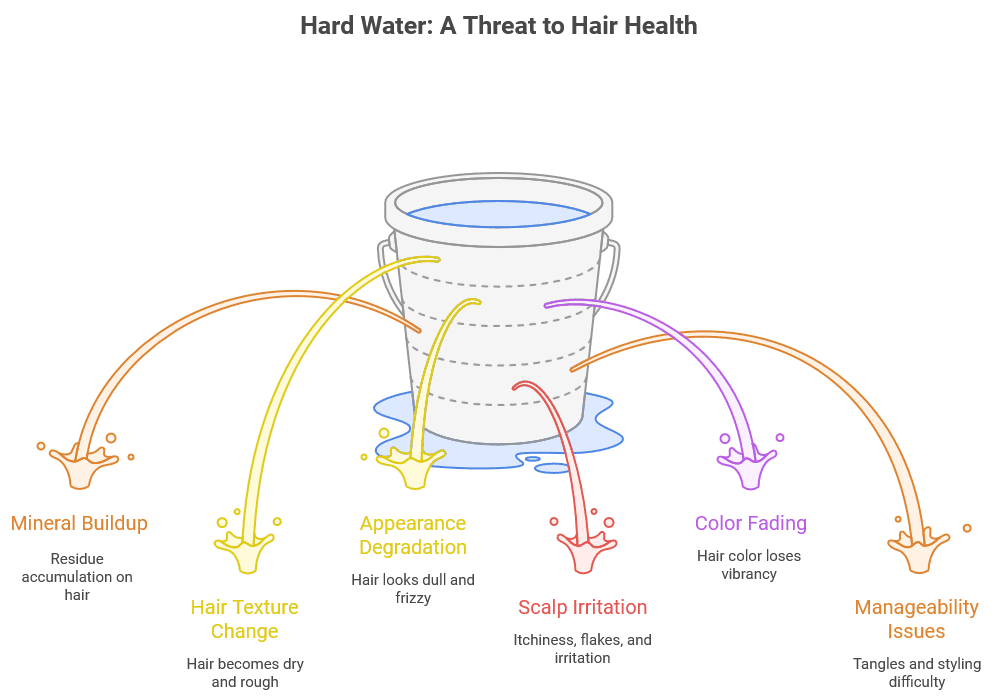The water you get from the tap isn’t just plain H2O. There are lots of other tiny particles floating in it. When there are fewer of these, it is called soft water, and when there is quite a bit, it is deemed hard. Now, for the most part, this is actually a good thing. Your body needs these extra minerals, but this could also have a detrimental effect on your skin and hair.
Can it actually lead to hair loss, though? That’s precisely what we are here to find out, but first, let’s see how you can determine what type of water you have in your home.
Did you know?
According to the 2025 ISHRS Practice Census, ISHRS physicians treated an average of 668 hair restoration patients in 2024—498 non-surgical and 156 surgical. That’s nearly 3.5 times more non-surgical patients, many of whom seek help due to common causes like genetic hair loss or external triggers such as hard water exposure
How to Know If You Have Hard Water
One of the biggest signs that your tap water is on the harder side is a buildup of limestone on your faucets and shower head. You may also notice that your scalp becomes reddish and itchy after washing your hair or that you experience pimple outbreaks on the top and back of your head.
If you have longer hair, you will also notice that it is quite dry, with split ends, due to the direct damage from the abrasive particles. Sometimes, it’s also easy to spot floating white particles in a freshly poured glass of water.
What’s in Hard Water That Affects Hair?
The main culprits here are calcium and magnesium, which are hard enough to cause damage and strip away the natural oils protecting your follicles. A study from 2016 involved washing hair samples for 15 females in hard and distilled water for a month to see if there would be any difference. The hard water damaged all the samples, making them thinner and leaving them looking disheveled.
Can Hard Water Really Cause Hair Loss?
While not an immediate risk, washing with hard water over longer periods can cause a lot of thinning, leading to hair breakage. As your scalp gets irritated and the follicles dry out, split, and break off, you can actually begin to see balding spots.
It’s not just that you are prone to extra shedding, but the roots themselves can become weaker as they don’t receive enough nutrients, and the pores can get clogged, causing additional problems. All this can have a profound effect on how your hair looks and feels.
Signs Your Hair Is Affected by Hard Water
To give you a better idea of what to look out for, we’ve compared the effects of hard vs soft water on your hair:
Characteristic | Hard Water | Soft Water |
Residue | Mineral buildup on hair and scalp | Minimal, rinses clean |
Texture | Dry, rough, and brittle | Soft, smooth, and silky |
Appearance | Dull and prone to frizz | Shiny and glossy |
Scalp Health | Can cause itchiness, flakes, and irritation | Overall healthier scalp |
Color | Faster fading, discoloration | Stays vibrant |
Manageability | More tangles, harder to style | Easier to comb, detangle, and style |
As you can see, it’s quite easy to spot any issues when you know what to look for, but many people spend years thinking that these effects are purely genetic.

How to Protect Your Hair from Hard Water
The good news is that there are quick and simple ways to combat these issues, as long as your hair hasn’t been permanently damaged. For one, you can install a water softener in your shower or use filtered water and distilled water in a pitcher to wash your hair.
You should start to see significant changes within a month or two, but if it stays quite thin and you don’t see any new growth or the fullness you once had, it’s probably time for more effective measures.
Hair Transplant: Long-Term Solutions for Hard Water Hair Damage
If the water in your home has already caused irreparable damage, and you’ve lost quite a bit of hair, the only way to promote hair growth is through a medical procedure. Luckily, you can get a hair transplant in Istanbul for a very reasonable price, with all-inclusive packages helping sort out all the logistics and allowing you to relax. All you have to do is contact the clinic for a free consultation and book a flight.
Here’s a quick rundown of the whole process. The surgeon will extract individual follicles from the back of the head, then create microscopic incisions in the recipient area and implant them one by one. It takes anywhere between 2000 and 6000 grafts, and ends up giving you a beautiful and fully natural look.
There are also long-hair and unshaven variations available, where your existing hair can cover everything up, so no one will even be able to tell you’ve had the operation.
FAQs
How does hard water lead to hair loss?
There is a high concentration of minerals in the water, causing hair damage and dryness, which can, over time, create noticeable bald areas. It can take a while, and some people are more susceptible than others, but it is a real risk.
Can this type of hair loss be reversed?
If you find an efficient way to keep the hard water away from your hair early enough, e.g., through specialized filters and softeners or using distilled water when washing, you can reverse some of the damage. However, while the existing hair will become fuller and shinier over the next few months, there may still be some permanent hair loss.
Are some hair types more vulnerable?
Yes, indeed, thinner and more porous hair is easier to damage, as the former is already prone to breakage and the latter soaks up more water particles, which then slowly grind it down. Those with curly hair are also more susceptible to these issues, as well as anyone who has used chemical dyes or similar treatments.
Is installing a water softener the only solution?
It’s a good first step for people with some of the smaller issues. However, it can’t help you with more severe damage, so a better long-term option is to get a hair transplant.

